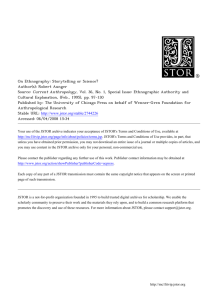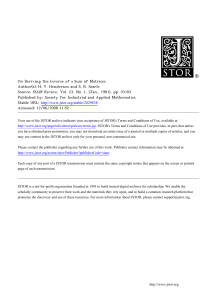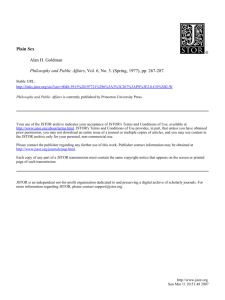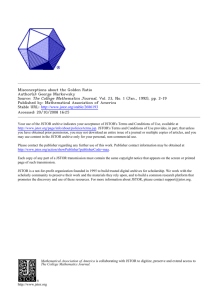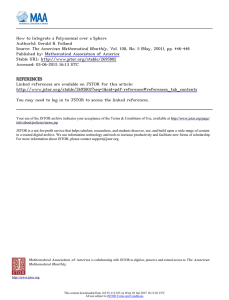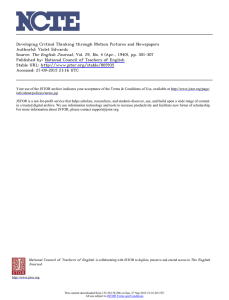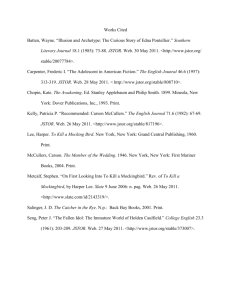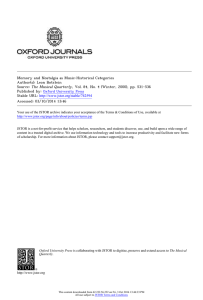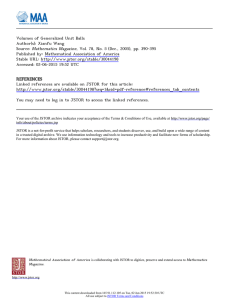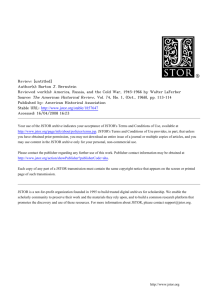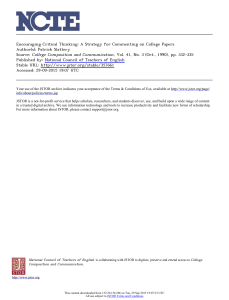The Single Tax Movement in the U.S.
advertisement
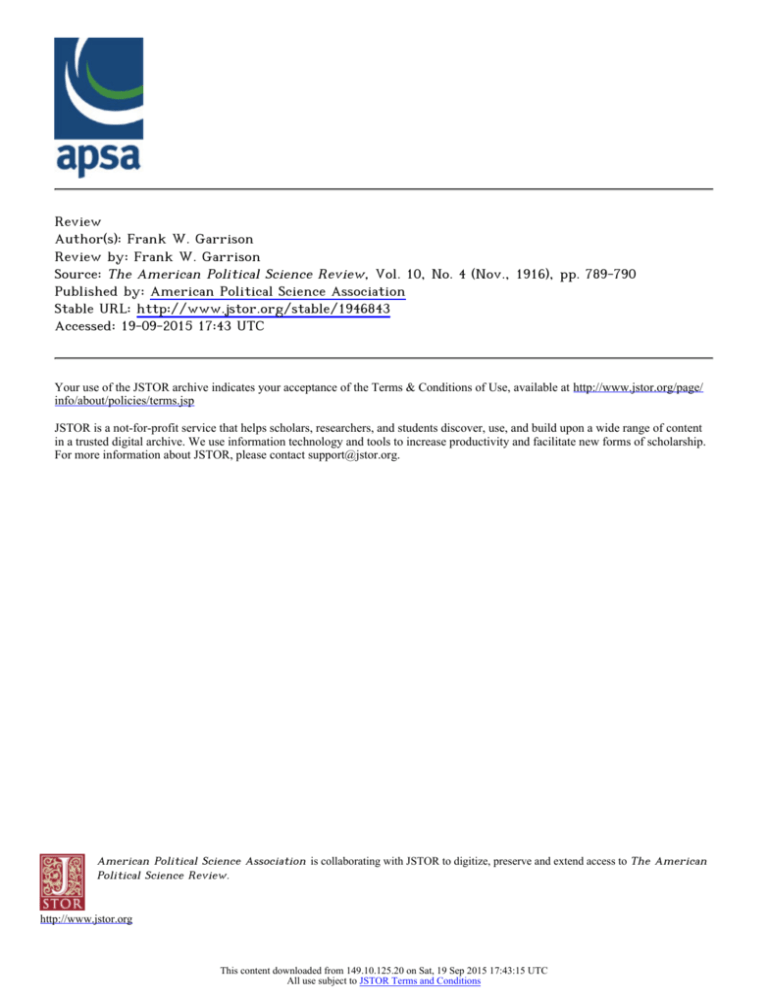
Review Author(s): Frank W. Garrison Review by: Frank W. Garrison Source: The American Political Science Review, Vol. 10, No. 4 (Nov., 1916), pp. 789-790 Published by: American Political Science Association Stable URL: http://www.jstor.org/stable/1946843 Accessed: 19-09-2015 17:43 UTC Your use of the JSTOR archive indicates your acceptance of the Terms & Conditions of Use, available at http://www.jstor.org/page/ info/about/policies/terms.jsp JSTOR is a not-for-profit service that helps scholars, researchers, and students discover, use, and build upon a wide range of content in a trusted digital archive. We use information technology and tools to increase productivity and facilitate new forms of scholarship. For more information about JSTOR, please contact support@jstor.org. American Political Science Association is collaborating with JSTOR to digitize, preserve and extend access to The American Political Science Review. http://www.jstor.org This content downloaded from 149.10.125.20 on Sat, 19 Sep 2015 17:43:15 UTC All use subject to JSTOR Terms and Conditions BOOK REVIEWS 789 The Single Tax Movement in the United States. By ARTHUR NICHOLS YOUNG. (Princeton: Princeton University Press. 1916. Pp. x, 340.) The Single Tax Movement in the United States has found an impartial chronicler in Dr. Arthur Nichols Young. After a brief view of the precursors of Henry George, and a description of the peculiar economic environment in California during his formative years, the narrative begins with an account of the activities which led to the writing of Progress and Poverty, and rapidly unfolds after the republication of that remarkable book in New York. The friendly reviews bf the new work soon gave place to heated criticism as popular enthusiasm brought the agitation within the realm of practical politics. From his arrival in New York in 1880, until his dramatic death on the eve of the mayoralty election in 1897, Henry George lived at high tension: writing, traveling, lecturing, spending his whole power in defending and popularizing his disturbing doctrine. The last half of the volume is given up to a clear and detailed summary of the political activities of single taxers in the States where their efforts have been concentrated, and an appraisal of the general scope and significance of the movement. A bibliography and index complete a useful study. Confining the investigation to the United States has led unavoidably to a somewhat arbitrary picture of what is essentially a world movement. A second volume would be needed to trace the influence of Henry George upon the economic development of the British Empire, the reception of his ideas in Europe, and present tendencies in some of the Spanish-American republics. In reviewing the course of the single tax movement, the historian notes a tendency to shift the emphasis from abstract reasoning to concrete political issues, although it was admittedly the human appeal which gave vitality to Progress and Poverty, with its passionate assertion that "private property in land is a bold, bare, enormous wrong, like that of chattel slavery." To socialize the rent of land and abolish all taxes (save that on land values) involves so revolutionary a process that his followers have been prone to take Henry George's advice and seek the line of least resistance. Their efforts have been directed to obtaining separate assessments of land and improvements, to securing home rule in taxation, direct legislation, and even to advocacy of the income tax as a means of reaching a part of the unearned increment. Thus it is maintained that, while single taxers have been an impor- This content downloaded from 149.10.125.20 on Sat, 19 Sep 2015 17:43:15 UTC All use subject to JSTOR Terms and Conditions 790 THE AMERICAN POLITICAL SCIENCE REVIEW tant factor in tax reform, they "have not been able to convince many that private ownership of land is ethically on a different basis from other property, or that to expropriate owners of existing land values is more just than to expropriate owners of other property values." Their work still lies ahead. Unaided today by the popular appeal of such striking personalities as Father McGlynn, Tom L. Johnson or Joseph Fels, they must win a hostile public to a belief in the equal rights of all to the use of the earth, or see the single tax movement relegated to the scrap heap of discarded Utopias. FRANK W. GARRISON. The Socialism of To-Day. Edited by WILLIAM ENGLISH WALL(New York: H. IHolt ING, J. G. PHELPS STOKES, and others. and Company. 1916. Pp. xvi, 642.) This volume is offeredas "a sourcebook of the present position and recent developmentof the socialist and labor parties in all countries, consisting mainly of original documents." It is edited by a committee of the IntercollegiateSocialist Society and is introducedby an historicalsketch of the growthof socialism(chapterI), stressingchiefly the platformsof its internationalcongresses. Then follow in sections II-V, twenty-fourchapterstracing the recent progressof the socialist movement in the various nations of the earth, emphasizingin brief, sketchy chapters official resolutions, platforms and important discussions, and also presentingtabulations of the results of recent elections, showing comparative gains and losses. From the demands of the socialist platformsthroughoutthe civilized world one may get in brief form a most excellent study of the various aspects of radicalism in widely differingtypes of civilization, so that these chapters are most helpful and suggestive. Most readers, however, will be best pleased with Part II, which devotes twenty chapters to a brief presentationand discussionof the attitude of socialism towards social problems. A brief statement of the problemintroduceseach chapter, and then follow official declarations and opinions,with indicationsas to the probablesocialist policy towards each of the problemsdiscussed, such problems, for example, as the generalstrike, unemployment,immigrationand woman suffrage. In these discussionsnaturallymost attention is given to English-speaking countries and to France and Germany. An Appendixdiscusses"Preparedness"fromthe standpointof Amer- This content downloaded from 149.10.125.20 on Sat, 19 Sep 2015 17:43:15 UTC All use subject to JSTOR Terms and Conditions

